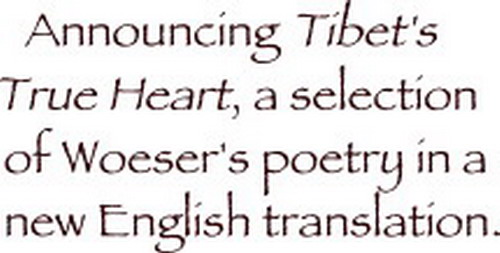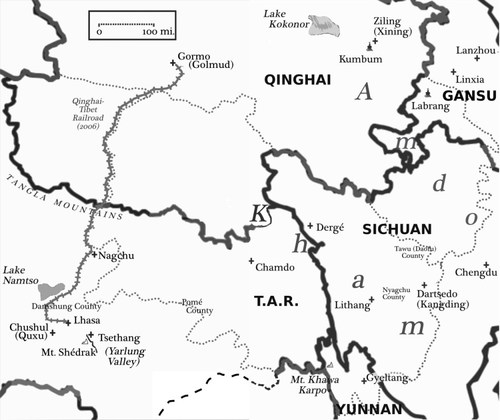


这是我的英文诗集,以及译者Mr.A.E.Clark为诗集做的网站题图、诗集中的地图。
有关诗集的网站是:http://www.raggedbanner.com
感谢Mr.A.E.Clark!感谢WA!
"For
fifty years, Tibet has been a largely silent world, one where no
Tibetan speaks out openly. But in 2003 the Tibetan poet Woeser stepped
forward from the shadows with Notes on Tibet, a set of uniquely frank
essays on modern life which, though quickly suppressed, were followed
by major works of poetry, reportage, history, and cyberjournalism. She
found herself compelled to move from Lhasa to Beijing, where, under
constant harassment by the authorities, she has continued, as if
without fear, to produce work that is honest, lyrical, and daring.
"This
collection of her poems, translated with great care and elegance by A.
E. Clark, allows outsiders for the first time to hear a Tibetan voice
speaking eloquently from inside Tibet about such forbidden subjects as
imprisonment, injustice, and Tibetan history, as well as about life,
love, memory, faith, and loss. She brings a passionate engagement and a
keen sensibility to the felt experience of contemporary Tibetan life."
Robert Barnett
Director, Modern Tibetan Studies Program, Columbia University
Author, Lhasa: Streets with Memories
CONTENTS
Preface
Acknowledgments
Remembering a Battered Buddha
One Kind of Emotion
Let me Write a Poem
On the Road
A Midsummer Night’s Dream
December
Panchen Lama
Scream
Witness to a Turn of Fate
Pallor of a Land of Snow
I Saw a Fish Flying in the Sky
Dergé
A Mala that Was Meant to Be
Embodiments
Way to Go
A Vow
Spinning Wheels
Lhasa Nights
Serves You Right!
Golden Season
Tsangyang Gyatso
Jotting Down Last Night’s Dream
Tibet’s Secret
Tears: A Final Song
When an Iron Bird Flew Past Shédrak Mountain
Strange Light
A Quick Note in the Small Hours
Dreamshadow
A Sheet of Paper Can Become a Knife
After a Few Years
Return to Lhasa
Showers of 1990
You Must Remember This
Parents
Roaming the Infinite Night
Nightfall on June 2nd
The Other Side
The Illness of Tibet
Come Home
Positioning
Of Mixed Race
The Past
Translator’s Notes
Geographical Note
Maps:
•Provincial & Traditional Boundaries
•Locations Mentioned in the Text
•Central Lhasa
References
Remembering a Battered Buddha
Twenty days since I left Lhasa
But still I see that statue of the Buddha with its face bashed in.
It was on a street vendor’s stand in front of the Tromsikhang neighborhood office.
I noticed it from a distance.
I’d gone to Tromsikhang Market to buy droma,
But at the sight a sudden grief assailed me.
I drew closer—couldn’t help it—to this thing so crushed:
It seemed alive, leaning against a shelf in agony,
The face hammered, an arm hacked off, the whole figure chopped off at the waist.
Hurting so bad, leaning against a rack of the goods
That surrounded it: soy sauce, bean jam, salad dressing, and roll after roll of toilet paper,
All introduced into our life long ago from inland China.
Around its neck an ornament, once exquisite, inlaid with colored stones,
And at its chest a wondrous beast with lion head and body of man,
Stacked on a fragmentary chorten.
In what sacred shrine or pious home were these things once venerated?
Hurting so bad and leaning against the rack of merchandise,
It emanated the calm of still waters, but pain stabbed into my marrow:
As I looked on in grief, I sensed a story being played out
That had both a present and a past.
I was moved by the shadowy fate that had brought us together,
As if melted snow from the high peaks had filled my being.
Hugging his knees, the peddler made a pitch:
“Come on, buy it! Don’t the old buddha look grand?”
“When did it get beat up like this?” I asked.
“Cultural Revolution, obviously!” he glanced up, “Had to be the Cultural Revolution.”
“How much?” I wanted to buy it, to take it home,
But this peddler from Jiangxi wouldn’t budge from three thousand.
So with reluctance and regret, and many an afterthought,
I left that broken buddha streaming rays of pain.
I only took some pictures,
So when I miss it I can turn on my computer and have a look.
Friends say it may have been a brand-new buddha, wrecked thus
To fetch a higher price, and the link to the Cultural Revolution was a fiction.
Maybe so; but the hurt remains.
I wrote these lines to try to let it go.
May 14, 2007
Beijing
On the Road
On the road with edgy mind,
I’ll flee the chaos of this floating world,
Pick a place to settle,
Find choice words
To tell this passing turn of the Wheel.
On the road one meets by chance
Men and women of immense dignity;
One’s natural pride is humbled.
The ruins that overspread Tibet with shadows dark as night
Have a nobility not found in ordinary men.
Among those encounters:
One dear to me, long−lost,
Brilliant, uncompromising,
Neglected.
I, too, am pure and honest;
Mine, too, a sincere and gentle heart;
I wish as seasons change I could change with them.
No need for gifts to one another;
We are the gifts.
On the road, an elder of my people says:
“Golden flowers bloomed on golden mountain;
While golden flowers bloomed, he did not come;
And when he came, the flowers had died.
Silver flowers bloomed on silver mountain;
While silver flowers bloomed, he did not come;
And when he came, the flowers had died.”
On the road, walking alone.
An old book without a map,
A pen, not much to eat,
Ballads from a foreign land:
These will suffice. On the road,
I see a black horse
Who does not bow his head to graze but shakes his hooves,
Vexed that he can’t run free.
Yet also, deep in meditation caves among the vast mountains,
The hidden forms of men.
What sort of heart will honor and revere them?
On the road, a pious mudra’s not complex,
But it ill suits a tainted brow.
A string of special mantras is not hard,
But they’re jarring, from lips stained with lies.
On the road,
I clutch a flower not of this world,
Hurrying before it dies, searching in all directions,
That I may present it to an old man in a deep red robe.
A wish−fulfilling jewel,
A wisp of a smile:
These bind the generations tight.
May 1995
Lhasa
Lhasa Nights
O Lhasa, dreamlike nights!
A certain lotus may have never bloomed,
Sometimes a wineglass shatters at a tap,
Yet there are people, just a few—who blessed
Them with such spirit?—to whom this movable feast
Seems Paradise for banishment self−chosen.
If (imperceptibly) they weep, it’s only
For a kinsman whom they couldn’t keep.
O Lhasa, nights of woe!
A certain bluebird may have never chirped,
And sometimes garments are begrimed with dust,
Yet there are people, just a few—who spread
That plague?—who see bright fleeting Time as but
A pool wherein the posturing ego sinks.
Illusions countless, ever so seductive,
Can’t lure a reincarnate kinsman back.
O Lhasa, nights like nowhere else!
A love there is that never came to pass,
And certain bloodlines gradually mixed,
Yet there’s a man, perhaps just one—what kind
Of lightning bolt?—who makes a stifling fate
Serve as the hinge of reconciliation.
Upon the endless wheel of birth and death
I wish you would forever be my kin!
1996
Lhasa
A Sheet of Paper Can Become a Knife
A sheet of paper can become a knife
—A rather sharp one, too.
I was only turning the page
When the ring finger of my right hand got sliced at the knuckle.
Though small, the sudden wound oozed blood,
A thread as fine as silk, and stung a little.
Startling transformation,
From paper into knife:
There must have been some mistake, or
Some kind of turning point.
This ordinary paper… a chill of awe.
October 16, 2007
Beijing
Comments